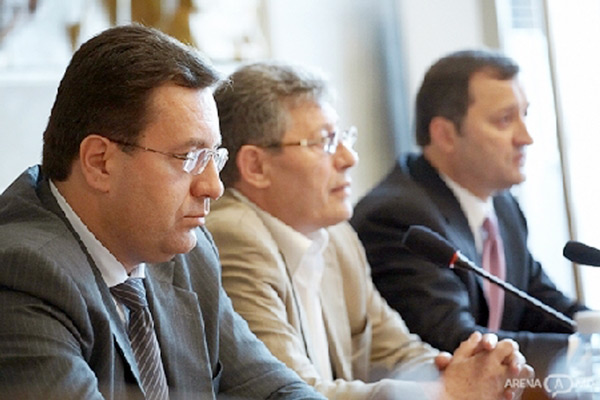
EU-Moldova Association Agreement May Yield Huge Political Windfall for Filat’s Party
Publication: Eurasia Daily Monitor Volume: 10 Issue: 58
By:

As Moldova’s pro-European parties in parliament attempt to prevent snap elections by negotiating over a new government, the country seems to be finally inching away from a political cliff (Prime.md, March 22). But after the political frenzy that toppled the Vlad Filat government in Moldova (see EDM, March 5) and turned the three former allies into bitter competitors, how sustainable and efficient will a patched together agreement among the Moldovan liberals (PL), liberal-democrats (PLDM) and democrats (PDM) actually be?
The viability of such an agreement should depend upon how well the three parties are able to address the root problem that forced them into the bellicose mode in the first place. The reasons voiced by the PL and the PDM cited Filat’s (leader of the PLDM) poor performance as head of government, corruption, and even retaliation for his dismissal of the PDM’s arguably most influential figure, Vlad Plahotniuc, from the parliament’s deputy speaker chair (Unimedia.md, March 5). Such suggestions are more of a smoke-screen, offered in an attempt to distort the real reason.
It appears the increasing popularity of the now former Prime Minster Filat, both domestically and internationally, has fueled a growing sense of insecurity among his party’s two former partners. Coupled with the forthcoming parliamentary elections next year, and an incremental but constant trend of diminishing popularity for the PDM and the PL, (Ipp.md, May, November 2012), the feud among the former partners within the Alliance for European Integration (AIE) was sure to erupt sooner or later. The latest incidents (see EDM, February 27) were the catalysts rather than the cause of the conflict.
As counterintuitive as it sounds, a critical source of serious anxiety for the PDM and the PL could be the substantial progress Moldova has made in its talks with the European Union on visa liberalization and the completion of negotiations on the EU-Moldova Association Agreement. These successes were emphasized by the EU foreign policy chief Catherine Ashton and EU Commissioner for Enlargement Stefan Fule in their letter of concern about the dismissal of the Filat government (Consilium.europa.eu, March 5).
This does not mean that the PL and the PDM parties are against Moldova advancing in its steps toward European integration. However, their domestic political agendas constrain their appreciation of such successes. Any politician able to plausibly take credit for progress in negotiations with the EU would be able to amass immense political capital. While the entire AIE coalition would benefit—including the PDM and the PL—the largest dividends would go to the head of the government, who until very recently was Vlad Filat.
Since 2009, when the AIE first formed a coalition government, the PLDM and its leader Filat have shown a continuous growth in popularity, while the PL and the PDM had somewhat less success. More than that, polls continue to show that Filat’s popularity has even surpassed Vladimir Voronin, the Communist Party (PCRM) leader (Ipp.md, November 2012; Politicon.md, March 4), who for several years has been the most popular politician in Moldova.
The PLDM is placed on the political spectrum between the PDM and the PL, and one common issue on their political agendas is European integration. And if Filat is successful in finalizing the EU-Moldova Association Agreement at the Vilnius Eastern Partnership Summit scheduled for November this year, it could trigger migrations toward Filat’s party among those PL and PDM supporters whose preferences are closer to the PLDM agenda.
The EU integration project is of paramount importance to a large part of the population. The latest statistics show that more Moldovans prefer to join the Russia-led Customs Union rather than the EU. But these poll numbers are best understood as an example of strategic voting—when people are told for years that the EU perspective is beyond the horizon, they start to switch their preferences for options perceived as more realistic. It is not hard to imagine that were Filat to achieve a breakthrough in Vilnius, his party could attract sufficient votes in the next elections to be able to govern without the PL, the PDM or both. This perspective is a disturbing scenario for these two parties, which would instead prefer to at least maintain their current share of voters for another four-year mandate. Their insecurity was heightened by Filat’s leadership style, which is perceived by the PL and the PDM as arrogant, bossy and exclusionary (Unimedia.md, March 7).
Thus, the toppling of the government was an attack against Filat the individual, and not the government as a whole. Both the PDM’s Marian Lupu and the PL’s Mihai Ghimpu insist they are willing to consider any other PLDM candidate as chief of government, except for Vlad Filat (Kommersant.md, March 5; Unimedia.md, March 7). The two leaders let slip remarks about Filat wanting uncontrolled power (Privesc.eu, March 5). Moldovan politics is very personality-driven, in the sense that people recognize individual politicians better than party brands; it is the politician’s popular support, which gives political weight to his or her party.
Both the PL and the PDM are going to pressure the PLDM into nominating a different candidate for prime minister in order to be able to achieve two key goals. First, they wish to prevent the political star of Vlad Filat from continuously ascending, thus also freezing the growth in popularity of the PLDM. Achieving the first goal would make it easier for Lupu and Ghimpu’s parties to accomplish their second goal: with decreased popular support, Filat would have less incentive to oppose what used to be a status quo of corrupt governance practices—indeed, Filat’s last attempt already cost him his position as prime minister.
There are hidden minefields in the PMD-PL strategy, however. The Russian example, where governmental corruption and lawlessness flourished in the 1990s under the label of democracy, is illustrative. Today, the word “democracy” has a derogatory meaning to the average Russian, and is linked to that anarchic decade. Accepting the PDM-PL plan would result in discrediting the very idea of democracy among Moldovan citizens and push them to vote in larger numbers for the Communist Party in next year’s parliamentary elections.




